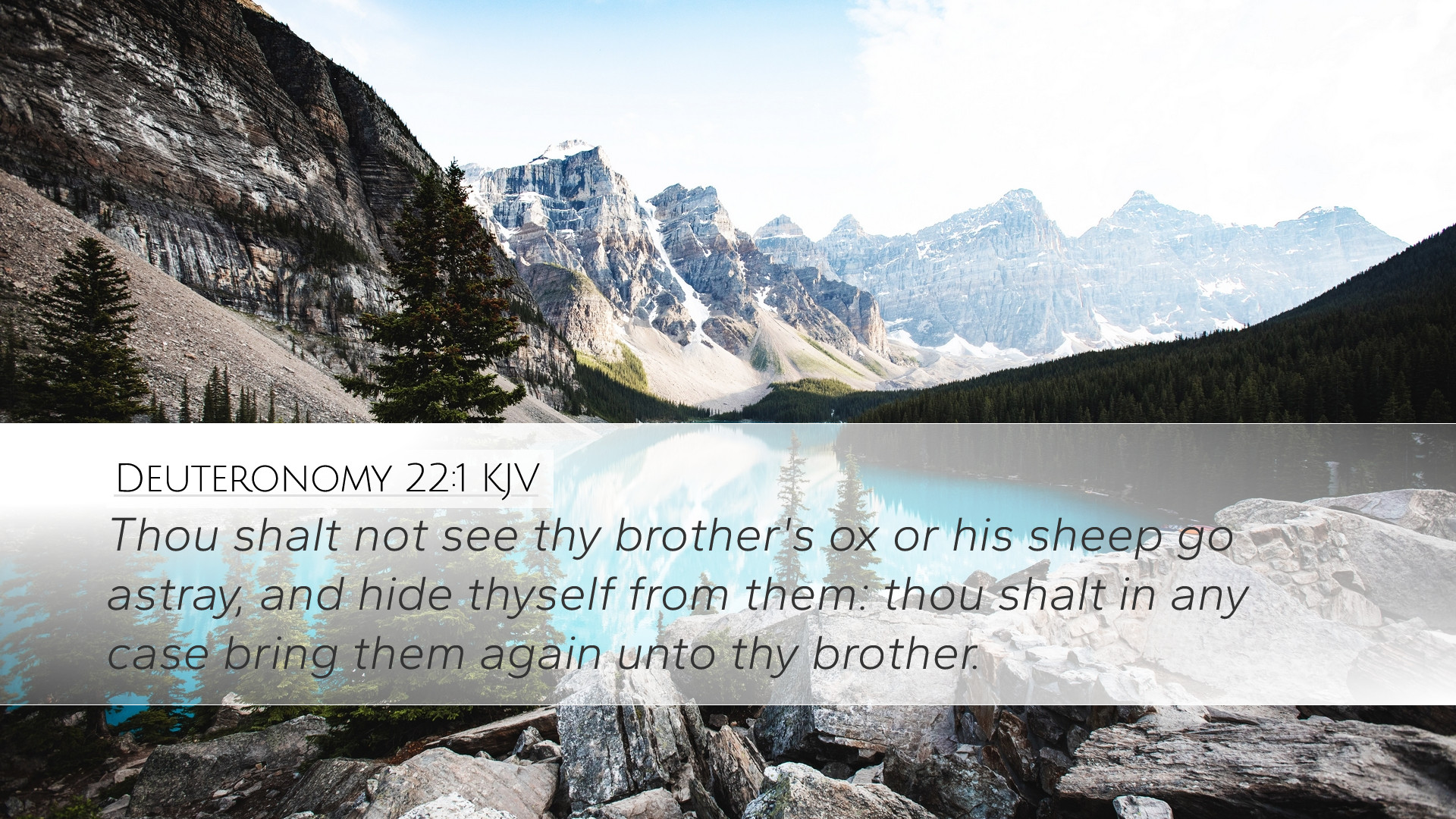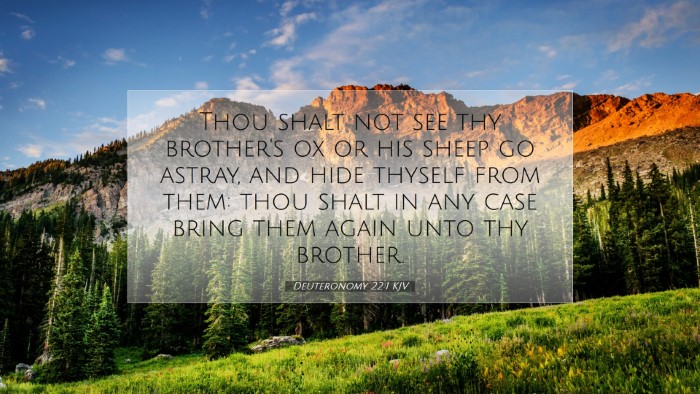Commentary on Deuteronomy 22:1
Verse Reference: Deuteronomy 22:1
Text: “You shall not see your brother’s ox or his sheep going astray, and ignore them. You shall take them back to your brother.”
Introduction
This verse introduces a powerful biblical principle of responsibility towards one's neighbor. It speaks to God's call for His people to act with compassion and care towards each other’s possessions, illustrating a larger ethical framework underlying the commandments. The guidance in this passage encourages a proactive approach in caring for one's community, echoing themes found throughout Scripture regarding love, community, and community responsibility.
Exegesis and Insights
Overall Interpretation
The directive in Deuteronomy 22:1 emphasizes the duty of an Israelite to attend to the welfare of his neighbor, particularly in situations regarding lost property. This concern is rooted in love for one’s neighbor, representing a core ethical teaching prevalent in both the Old and New Testaments.
Matthew Henry's Commentary
Henry states that this commandment is a clear expression of brotherly kindness. The law, as given here, calls individuals not merely to refrain from theft and loss but to actively participate in restoring what belongs to others. He elucidates that the shepherd's care for the wandering sheep symbolizes Christian love and duty towards fellow believers. Henry emphasizes that ignoring another’s loss is a transgression against one's conscience and community.
Albert Barnes' Commentary
Barnes expands on the significance of personal responsibility articulated in this verse. He highlights that the ‘ox’ and ‘sheep’ are representative of one's livelihood and means of sustenance. The principle behind this directive extends beyond mere livestock; it involves preserving communal integrity and social responsibility. Barnes notes that the command not only encompasses physical possessions but also extends to moral support among community members. Restoration should reflect God's love and righteousness.
Adam Clarke’s Commentary
Clarke emphasizes the importance of community dynamics within the verse. He suggests that the obligation to return lost property indicates the essence of brotherhood amongst individuals. For Clarke, the phrase “going astray” holds a deeper theological meaning; it metaphorically addresses the spiritual and moral deviation that occurs within the community. The act of restoring lost items serves as a reminder of the call to aid those who stray from righteousness, thereby fostering a climate where love and accountability thrive.
Theological Implications
Community Responsibility
This passage invites reflection on the social fabric of the faithful community. Each member bears a weighty responsibility towards their neighbors' well-being. Ignoring such responsibilities is not merely an oversight; it is reflective of a heart disconnected from the values of the Kingdom of God. This echoes Jesus' teaching in the Gospels, where active love toward others is the hallmark of a follower of Christ.
Restorative Actions
Actively seeking to restore what is lost underscores a commitment to justice and restoration that resonates through biblical teachings. The principle of recovery is a reflection of God’s character: He seeks the lost and restores them to Himself. This sense of divine commitment is mirrored in community behavior, encouraging believers to emulate such actions in their interpersonal relations.
Practical Application
In practical terms, this passage challenges pastors, theologians, and students of the Scripture to consider how they contribute to their communities. Concrete actions such as helping those in need, nurturing connections among church members, and even addressing issues of injustice reflect the heart of the instruction in Deuteronomy 22:1. This involvement can manifest in various forms: offering help to those facing difficulties, supporting local outreach programs, and fostering an environment of care and accountability.
Critical Reflections
Broader Biblical Context
Understanding this verse also requires a glance at its broader context within the Book of Deuteronomy. The surrounding laws serve to create a cohesive community reflective of God’s covenant with Israel. Here, we find an overarching narrative calling the people towards ethical living that honors both God and one another.
Link with New Testament Ethics
The ethical implications of this verse find resonance in the teachings of Jesus, particularly in the parable of the Good Samaritan (Luke 10:25-37). The call to love one’s neighbor and take action in their time of need cements the continuity of this theme within Christian ethics. It also invites a self-examination for the modern church: how well are we practicing the care and concern mandated here?
Conclusion
Deuteronomy 22:1 serves as a profound reminder of the Christian calling to live in compassionate community, actuating love through responsible, restorative actions. As teachers and students of God's Word engage with this passage, it not only challenges them to observe laws of ethical behavior but also to embody the very nature of God's restorative love in their communities. In a world rife with indifference, the principles outlined in this verse call believers to rise above self-interest, embracing a life marked by faithfulness to both God and neighbor.


